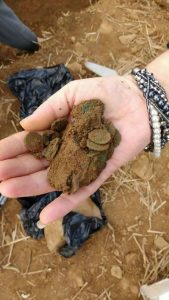A pair of detectorists discovered a trove of nearly 2000 ancient Roman coins while sweeping a freshly ploughed field with metal detectors near Hayle, Corwall, United Kingdom.

The individuals are members of the metal detecting club Kernow Search and Recovery and had been working together to sweep a recently ploughed farmer’s field. First coins have been found within a couple of minutes after the search started. A cluster of coins was even discovered after the removal of the ploughed topsoil. An archaeologist was called by the detectorists at the site, and the find was secured. Researchers were also able to secure parts of a tin vessel that was likely used for storage of the coins – vessels made of this material are rarely found as containers of large amounts of coins found in archaeological discoveries.

The coins were taken away for inspection by Royal Cornwall Museum and the British Museum after the discovery. The coins are known as radiates and all made of bronze with one percent silver. They were a common currency in the late Roman period. In about 260 AD, Briton was part of a breakaway Gallic empire. Some of the coins were identified and were struck with the representations of Valerian (253-60 AD), Salonina, Saloninus, Gallienus (260-8 AD), Claudius II (268-70 AD), Divus Claudius II (270 AD), Quintillus (270 AD), Aurelian (270-5 AD), Postumus (260-8 AD), Marius (269 AD), Victorinus (269-71 AD), Divus Victorinus, Tetricus I (271-4 AD), Tetricus II. Of the rest, 78 coins were of uncertain Gallic origin, there were 54 where the emperor could be seen but not identified and 645 coins which were too badly corroded to be made out.

(after Cornwall Live)